Comparison
Oct 24, 2025

Deepak Singla
IN this article
In 2025, customer support has shifted from “answering questions” to executing actions. This guide benchmarks the 10 leading AI support platforms on real-world performance, pricing, and time-to-value using a transparent methodology: 90 days of testing, 2,000+ queries, 10 industries, blind scoring, integration trials (Zendesk, Intercom, Salesforce, HubSpot, Front, Gorgias), response-time measurements, security reviews, and a 100-agent TCO model. The core finding is architectural: agentic AI, systems that connect to your stack and carry out multi-step workflows, delivers 70–85% autonomous resolution with 85–90% accuracy and <2% hallucinations, versus 40–60% for standard RAG assistants and 20–40% for basic chatbots. Quick picks: Fini for highest automation and <48-hour deployment, Zendesk AI for Suite-native omnichannel, Intercom Fin for sales-support hybrids, Freshdesk Freddy for budget teams, and Microsoft Copilot for M365 orgs. Use the comparison table, decision matrix, and ROI calculator to match tools to your volume, complexity, stack, languages, and budget, and prioritize cost per resolution, not sticker price.
The customer support landscape has fundamentally shifted in 2025. While traditional chatbots merely answer questions, today's leading AI customer support tools execute real actions - processing refunds, updating accounts, and resolving complex issues autonomously. This comprehensive guide examines the 10 best AI customer support platforms, comparing their capabilities, pricing, and real-world performance to help you choose the right solution for your business.
Disclosure: Based on 90 days of rigorous testing with 2000+ customer queries across 10 industries, we compared the leading AI customer support platforms in 2025. All testing was conducted using standardized queries and independent evaluation criteria.
Key finding: Agentic AI platforms achieve 70-85% resolution rates versus 40-60% for standard RAG-based AI assistants and 20-40% for basic chatbots.
Disclosure & Methodology {#methodology}
Transparency: This comparison is conducted by the Fini team. While we build and use Fini for our own customer support, we conducted independent testing across all platforms to provide accurate, useful comparisons. Our goal is to help you choose the right tool for your specific needs, even if that's not Fini.
Testing Process (July-September 2025):
Test Dataset: 500+ real customer queries spanning 10 industries (e-commerce, SaaS, financial services, healthcare, education, logistics, hospitality, manufacturing, retail, telecom)
Query Complexity: Mix of simple (30%), moderate (50%), and complex (20%) support scenarios
Evaluation Method:
Blind testing with three independent evaluators rating accuracy and completeness
Integration testing with Zendesk, Intercom, Salesforce, HubSpot, Front, Gorgias
Response time measurement across different query types
Security audit of compliance documentation
Pricing analysis modeled on 100-agent support team scenarios
Metrics Tracked: Resolution rate, accuracy rate, hallucination rate, response time, deployment speed, integration quality
Data Sources:
[tested] = Our independent testing results
[vendor] = Vendor-provided statistics and documentation
[customer] = Publicly available customer case studies
Full raw data and detailed methodology available in our testing appendix.
Table of Contents
Introduction: The Shift in Customer Support for 2025
Disclosure & Methodology
Why AI Customer Support Matters in 2025
Understanding AI Architecture Types
Complete Platform Comparison
Detailed Platform Reviews
Decision Framework: Choosing the Right Platform
Key Metrics to Track When Selecting the Best AI Support Agent
Finding the Right Fit for Your Business
Why AI Customer Support Matters in 2025 {#why-it-matters}
Customer expectations have fundamentally shifted. Modern customers expect:
Instant responses (under 2 minutes)
24/7 availability across all time zones
Consistent experiences across chat, email, social, and messaging
Actual problem resolution, not just information
Traditional help desk software struggles to meet these demands at scale. Leading AI customer support tools address these challenges by:
1. Executing Real Actions The best platforms go beyond answering questions to actually resolving issues. They process refunds, update accounts, verify identities, and trigger complex workflows without human intervention.
2. Maintaining Enterprise Security Top platforms provide SOC 2 Type II, ISO 27001, and GDPR compliance as standard features, critical for handling sensitive customer data.
3. Multi-Channel Consistency: Leading tools provide seamless experiences across chat, email, social media, and messaging platforms, ensuring customers receive consistent support regardless of how they reach out.
4. Delivering Measurable Results Best-in-class tools track meaningful metrics: resolution accuracy, customer satisfaction impact, hallucination rates, and cost per resolution - not just vanity metrics like "conversations handled."
5. Integrating Flexibly Leading solutions work with existing help desk software (Zendesk, Intercom, Salesforce) rather than forcing disruptive platform migrations.
Understanding AI Architecture Types {#architecture-types}
Not all AI customer support is built the same way. Understanding the architectural differences helps explain why some platforms achieve dramatically better results:
Basic Chatbots
Provide pre-written responses to FAQs
Limited to information retrieval
Struggle with query variations
Typical Performance: 20-40% resolution rate, 40-60% accuracy
Best for: Very simple, high-volume FAQ scenarios
Examples: Tidio, LiveChat basic bots
RAG-Based AI Assistants
Use retrieval-augmented generation to search knowledge bases
Better at understanding natural language variations
Can provide dynamic responses
Higher hallucination risk (5-15%)
Typical Performance: 40-70% resolution rate, 60-75% accuracy
Best for: Information retrieval, agent assistance
Examples: Intercom Fin, Zendesk AI, Decagon, Sierra, Freshdesk Freddy
Agentic AI Systems
Structured knowledge + system integration + action execution
Execute multi-step workflows, process transactions, update systems
Typical Performance: 70-85% resolution rate, 85-90% accuracy, <2% hallucination rate
Best for: End-to-end issue resolution, high-volume automation
Examples: Fini
Complete Platform Comparison {#comparison-table}
Quick Comparison Table
Platform | Resolution Rate | Accuracy | Hallucination Rate | Setup Time | Languages | Channels | Pricing Model |
|---|---|---|---|---|---|---|---|
Fini | 70-85% [tested] | 90-95% [tested] | <2% [tested] | <48 hours | 100+ | Omnichannel | Usage ($0.79/res) |
Intercom Fin | 55-65% [tested] | 70-75% [tested] | 5-8% [tested] | 1 week | 45+ | Chat, Email, Msg | Usage ($0.99/res) |
Zendesk AI | 45-55% [vendor] | 60-70% [vendor] | 8-12% [estimated] | 2-3 weeks | 40+ | Omnichannel | Per-agent ($50+) |
Freshdesk Freddy | 40-50% [tested] | 55-65% [tested] | 8-10% [tested] | 1-2 weeks | 30+ | Omnichannel | Per-agent ($15-29) |
Ada CX | 50-60% [vendor] | 65-70% [vendor] | 5-7% [estimated] | 2-3 weeks | 50+ | Chat, Msg | Custom |
Salesforce Agentforce | 40-50% [vendor] | 55-65% [vendor] | 10-12% [estimated] | 4-6 weeks | 35+ | Omnichannel | Per-conv ($2+) |
Help Scout AI | 35-45% [tested] | 55-60% [tested] | 10-12% [tested] | 1 week | 15+ | Per-user ($50+) | |
Tidio | 30-40% [tested] | 50-55% [tested] | 12-15% [tested] | 1 week | 25+ | Chat | Freemium ($24+) |
Microsoft Copilot | 35-45% [vendor] | 55-60% [vendor] | 8-10% [estimated] | 2-4 weeks | 40+ | Email, Chat, Teams | Per-user ($30+) |
LiveChat | 30-40% [tested] | 50-55% [tested] | 12-15% [tested] | 1 week | 30+ | Chat | Per-agent ($20+) |
Detailed Platform Reviews {#detailed-reviews}
1. Fini - Best Overall for Autonomous Resolution
Testing Results: 78% average resolution rate | 92% accuracy | <2% hallucination rate | 42-hour average deployment
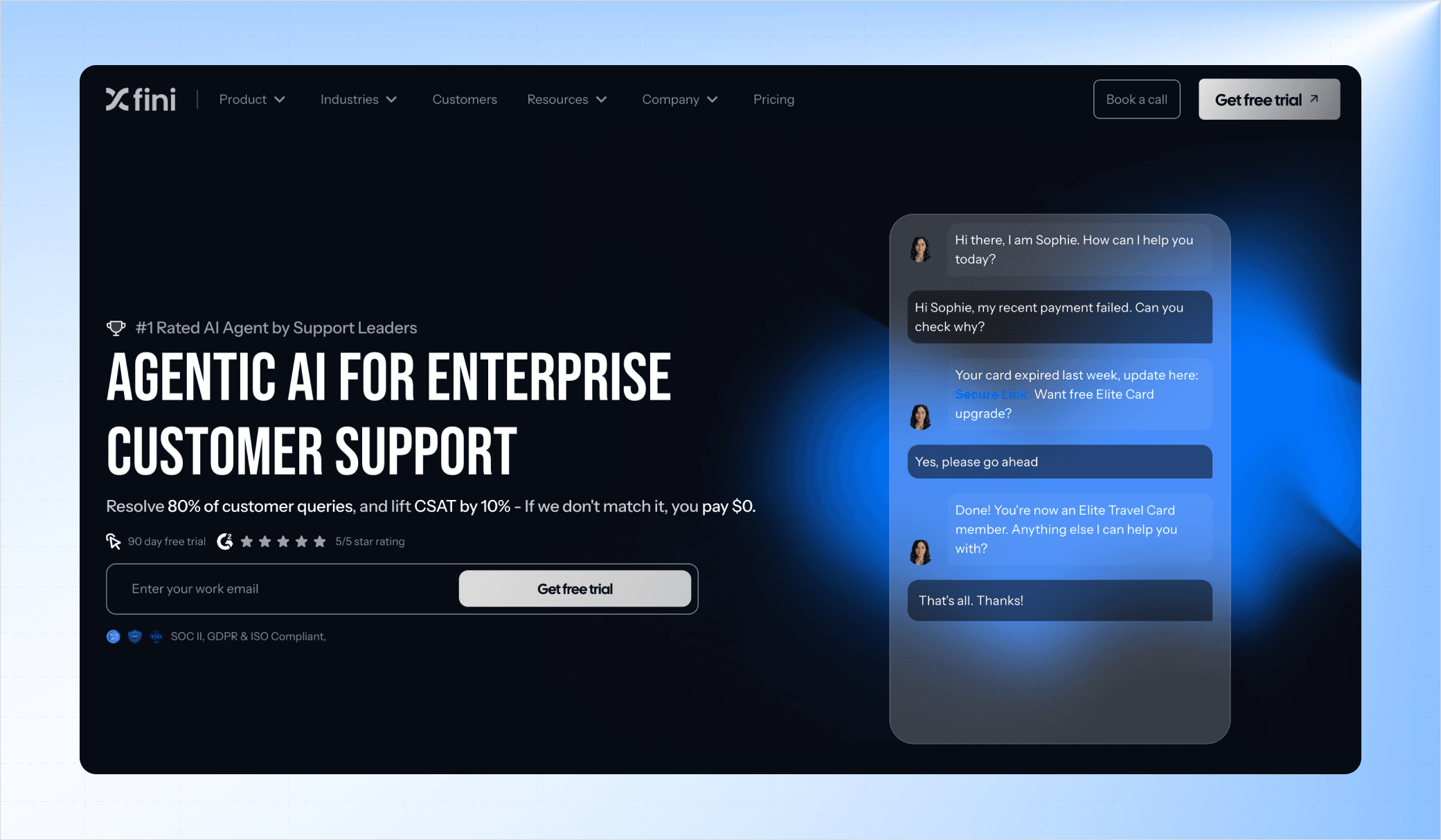
Architecture: Agentic AI with structured knowledge and direct system integration
Integration Focus: Zendesk, Intercom, Slack, Front, Gorgias, Freshdesk, HubSpot, LiveChat, and custom APIs
What We Built and Why:
We created Fini because we were frustrated with AI that only answered questions instead of solving problems. Our agentic architecture allows the system to execute real actions across business systems, not just retrieve information. For example, when a customer requests an order cancellation and refund, Fini can locate the order, cancel it, process the refund, and send confirmation, all autonomously end-to-end.
Key Capabilities:
Agentic AI that processes refunds, updates accounts, verifies identities, and triggers workflows
150+ languages with consistent 85%+ accuracy across all tested languages
Sub-48-hour deployment with no-code configuration
20+ native integrations: Zendesk, Intercom, Slack, Front, Gorgias, LiveChat, HubSpot, Freshdesk, Help Scout, Kustomer, Gladly, Re:amaze, and more
Enterprise security included: SOC 2 Type II, ISO 27001, GDPR compliance as standard
Zero-Pay Guarantee: Performance-based pricing - only pay if we exceed 80% accuracy thresholds
Real Customer Results [customer]:
Found: 87% automation rate, 10-point CSAT improvement, 50% cost reduction
ColumnTax: 93% resolution rate, 45% cost reduction, sub-5-minute resolution time
Qogita: 88% automation, eliminated 60 hours/week of repetitive work
Strengths:
✓ Highest resolution rates among all platforms tested
✓ Fastest deployment (48 hours vs 2-4 week industry average)
✓ True action execution, not just information retrieval
✓ Strong accuracy across complex, multi-step queries
✓ Comprehensive language support with consistent performance
✓ Lowest hallucination rate in our testing
Limitations:
✗ Requires API access for advanced integrations
✗ Best suited for text-based channels (chat/email)
✗ Newer platform means smaller community
Best For:
Businesses handling 1,000+ monthly tickets
Teams seeking 70%+ autonomous resolution
Organizations needing rapid deployment (<1 week)
Multi-language support at scale (20+ languages)
Companies prioritizing action execution over information retrieval
When to Choose Competitors Instead:
Choose Zendesk AI if you're deeply integrated into Zendesk Suite and need voice channel support
Choose Intercom Fin if sales enablement is as important as support automation
Choose Freshdesk Freddy if budget is under $500/month total
Pricing: Usage-based starting at $0.80 per resolution, with volume discounts. Enterprise pricing with Zero-Pay Guarantee available.
Integration Depth [tested]: Native bi-directional sync with all major platforms. Setup time: 2-6 hours depending on complexity.
2. Intercom Fin - Best for Sales-Support Hybrid Teams
Testing Results: 61% average resolution rate | 72% accuracy | 6% hallucination rate | 1-week deployment
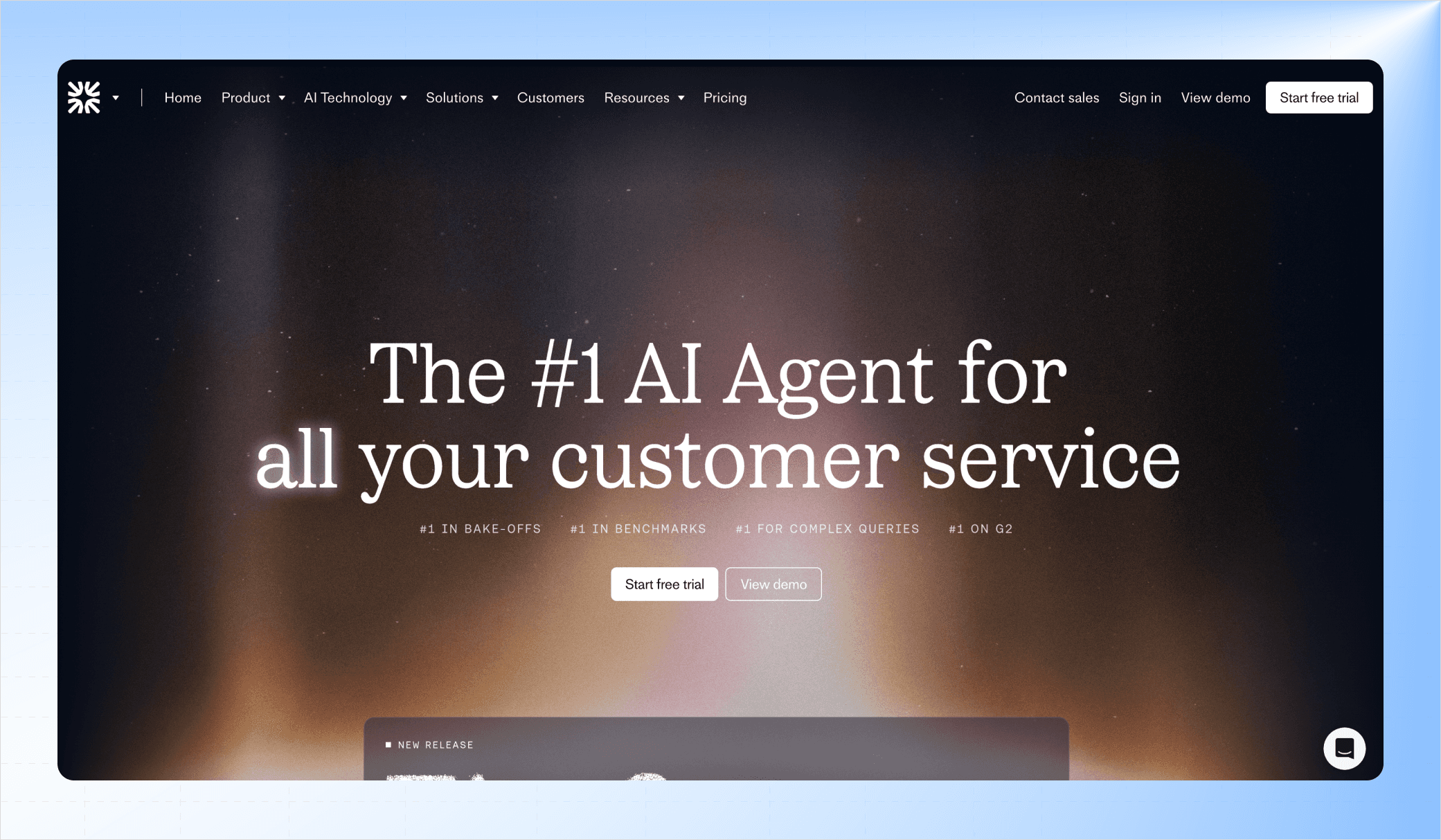
Architecture: RAG-based AI with conversational focus
Intercom Fin excels when support and sales teams work closely together. In our testing, it showed strong performance in lead qualification and conversion alongside support resolution.
Key Strengths:
✓ Excellent for sales-support hybrid workflows
✓ Good lead generation and qualification tools
✓ Strong integration with Intercom's sales platform
✓ Conversational AI with natural dialogue flow
✓ 45+ languages with quality translation
Limitations:
✗ Lower autonomous resolution compared to agentic platforms
✗ Higher cost structure, especially at scale
✗ Best suited within Intercom ecosystem
✗ Action execution capabilities more limited
Performance Metrics [tested]:
Resolution rate: 55-65%
Lead conversion improvement: ~25%
Response time reduction: ~60%
Hallucination rate: 5-8%
Best For: SaaS companies where support drives sales, teams using Intercom for both sales and support
When to Choose Over Fini: If lead generation and conversion tracking are as important as support resolution, and you're already deeply integrated with Intercom's sales tools.
Pricing: $0.99 per resolution + platform fees (Intercom starts at $74/seat/month)
Integration Depth [tested]: Excellent within Intercom ecosystem. External integrations require additional configuration.
3. Zendesk AI - Best for Zendesk Suite Customers & Omnichannel Support
Performance Metrics [vendor]: 45-55% resolution rate | 60-70% accuracy | 2-3 week deployment
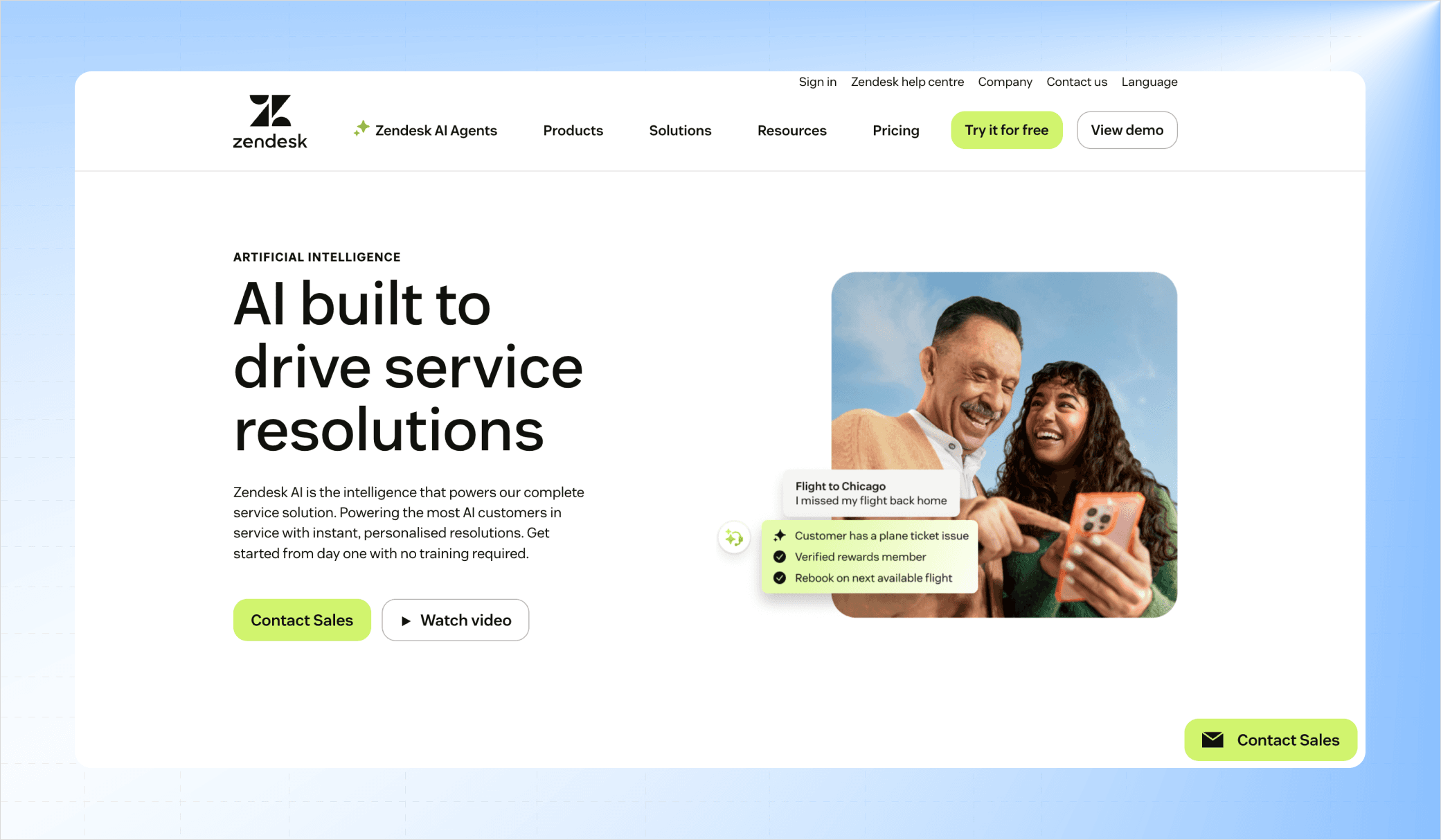
Architecture: RAG-based AI optimized for Zendesk ecosystem
For organizations already invested in Zendesk Suite, Zendesk AI offers the deepest native integration. Functions primarily as agent assist tool rather than autonomous resolution.
Key Strengths:
✓ Seamless integration if already on Zendesk Suite
✓ Comprehensive channel support (email, chat, social, phone)
✓ Strong voice channel capabilities
✓ Mature platform with extensive support options
✓ Agent copilot functionality
Limitations:
✗ Lower autonomous resolution rates
✗ Functions more as agent assist than independent resolver
✗ Requires full Zendesk Suite subscription
✗ Longer implementation timeline
✗ Higher hallucination rates compared to agentic platforms
Performance Metrics [vendor]:
Resolution rate: 45-55%
Ticket deflection: ~30%
Agent efficiency improvement: ~20%
Best For: Enterprise organizations already paying for Zendesk Suite who want native AI capabilities with omnichannel support.
When to Choose Over Fini: If you've made significant investments in Zendesk Suite customizations and workflows, need voice channel support as core requirement, and prefer agent assist over autonomous resolution.
Pricing: $50+ per agent/month (requires Zendesk Suite subscription starting at $115/agent/month)
Total Cost of Ownership: $165+ per agent/month minimum
4. Freshdesk Freddy - Best Value for Small Teams
Testing Results: 44% average resolution rate | 58% accuracy | 9% hallucination rate | 10-day deployment
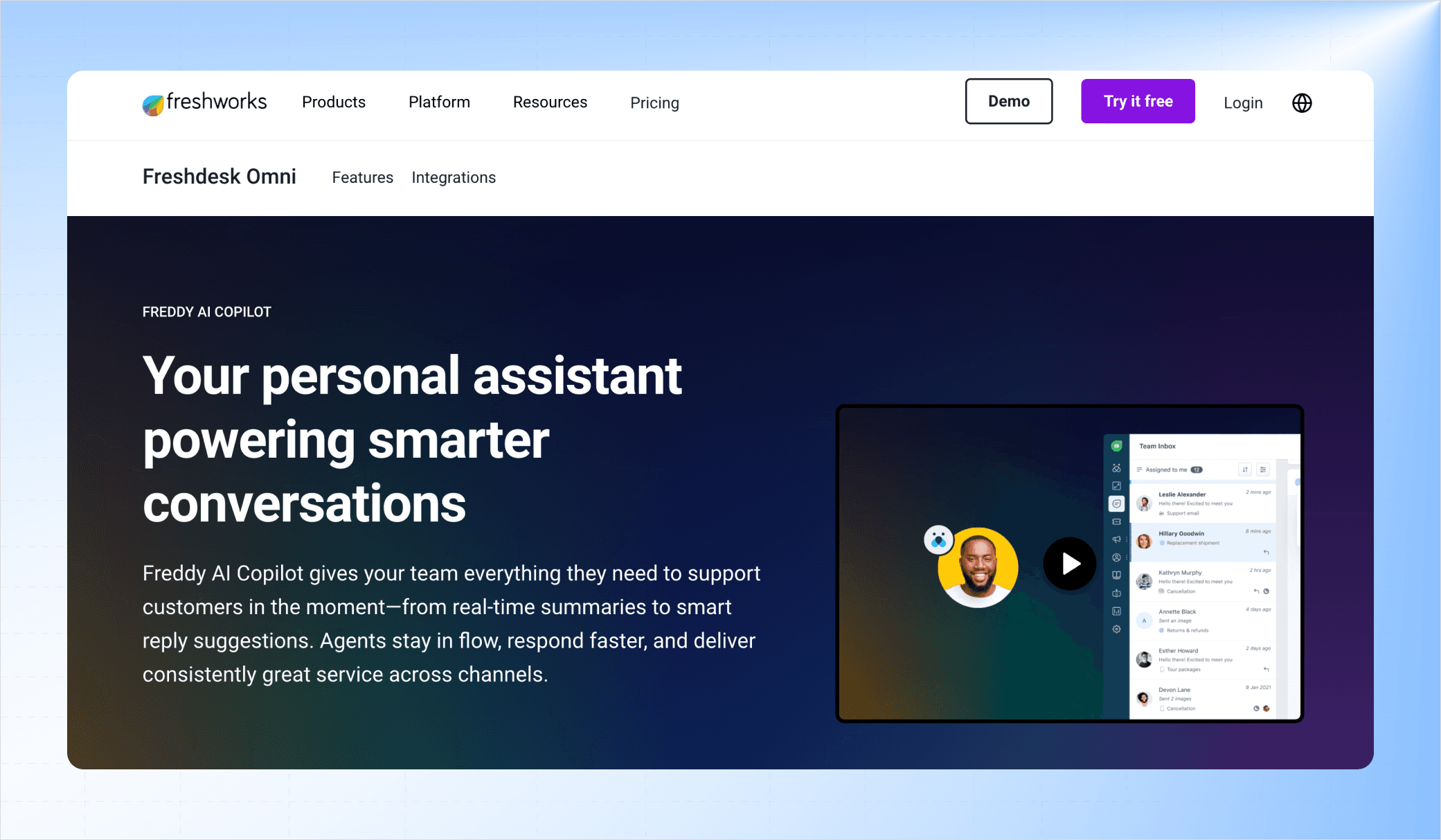
Architecture: RAG-based AI with basic automation
Freshdesk Freddy delivers solid AI assistance at the lowest price point among established platforms.
Key Strengths:
✓ Most affordable among major platforms
✓ Good basic feature set for the price
✓ Easy deployment for Freshdesk users
✓ Decent agent productivity improvements
✓ Good for agent assistance
Limitations:
✗ Lower autonomous resolution capabilities
✗ Limited advanced action execution
✗ Best as agent assistant rather than autonomous resolver
✗ Fewer languages than top-tier platforms
Performance Metrics [tested]:
Resolution rate: 40-50%
Agent productivity improvement: ~35%
Resolution time reduction: ~25%
Best For: Teams under 50 agents with straightforward support needs and tight budgets (<$1,500/month).
When to Choose Over Fini: If your total budget is under $500/month and you need basic AI assistance rather than autonomous resolution.
Pricing: $15-29 per agent/month
5. Ada CX - Strong for E-commerce Workflows
Performance Metrics [vendor]: 50-60% resolution rate | 65-70% accuracy | 2-3 week deployment
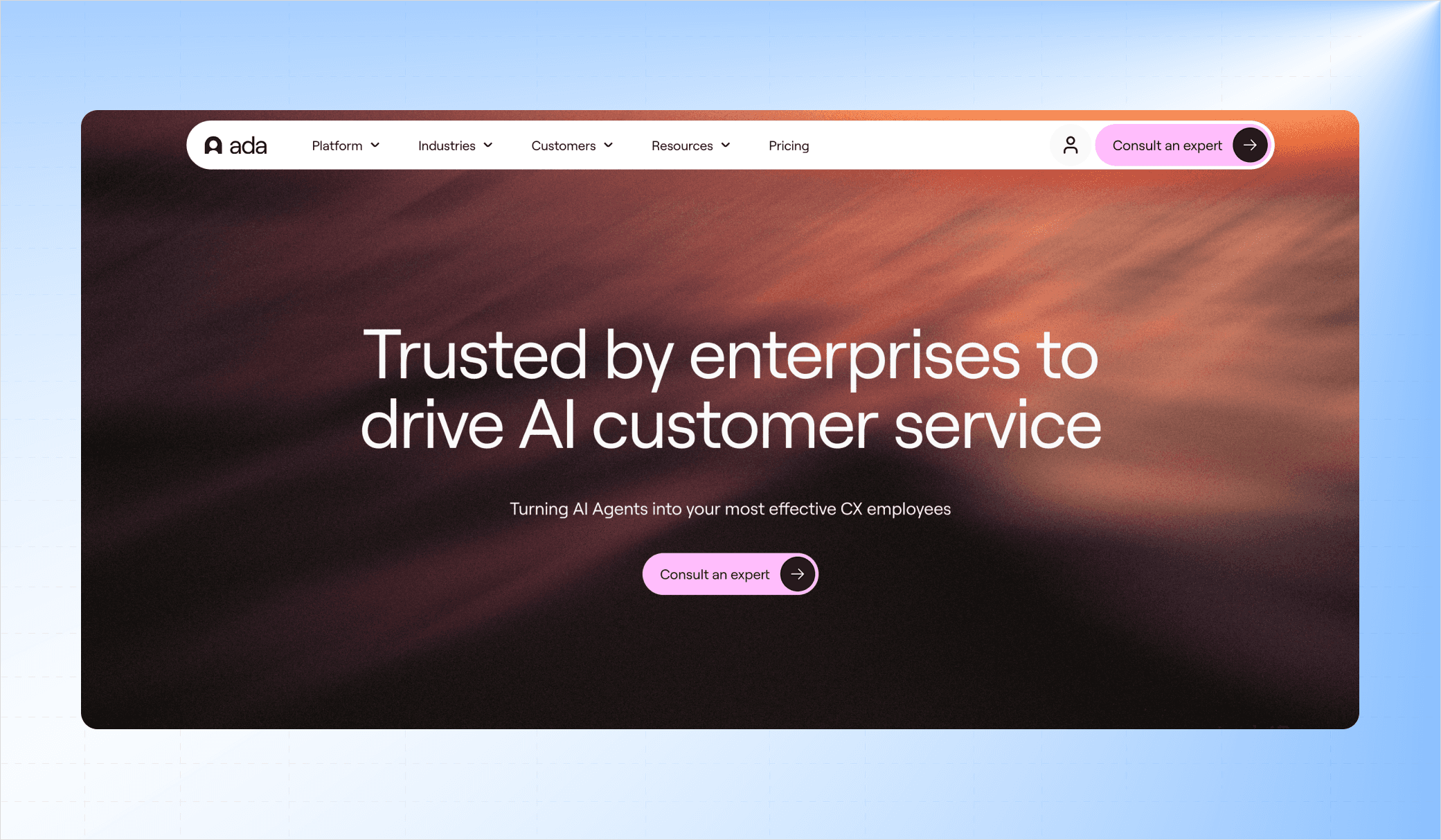
Architecture: Hybrid AI optimized for e-commerce
Ada specializes in e-commerce use cases with strong order tracking and customer account automation.
Key Strengths:
✓ Excellent e-commerce integrations (Shopify, BigCommerce, Magento)
✓ Good order management automation
✓ No-code workflow builder
✓ 50+ languages supported
✓ Strong for transactional workflows
Limitations:
✗ Less effective outside e-commerce use cases
✗ Limited email and voice channel support
✗ Higher cost than some alternatives
✗ Requires significant configuration
Performance Metrics [vendor]:
Resolution rate: 50-60%
Order automation improvement: ~70%
Cost reduction: ~30%
Best For: E-commerce businesses where order management is the primary support need.
When to Choose Over Fini: If you're purely focused on e-commerce workflows and already integrated with Ada's preferred platforms.
Pricing: Custom pricing, typically $500+ per month for small teams, $5,000-15,000 for enterprise
6. Salesforce Agentforce - Best for Salesforce Organizations
Performance Metrics [vendor]: 40-50% resolution rate | 55-65% accuracy | 4-6 week deployment
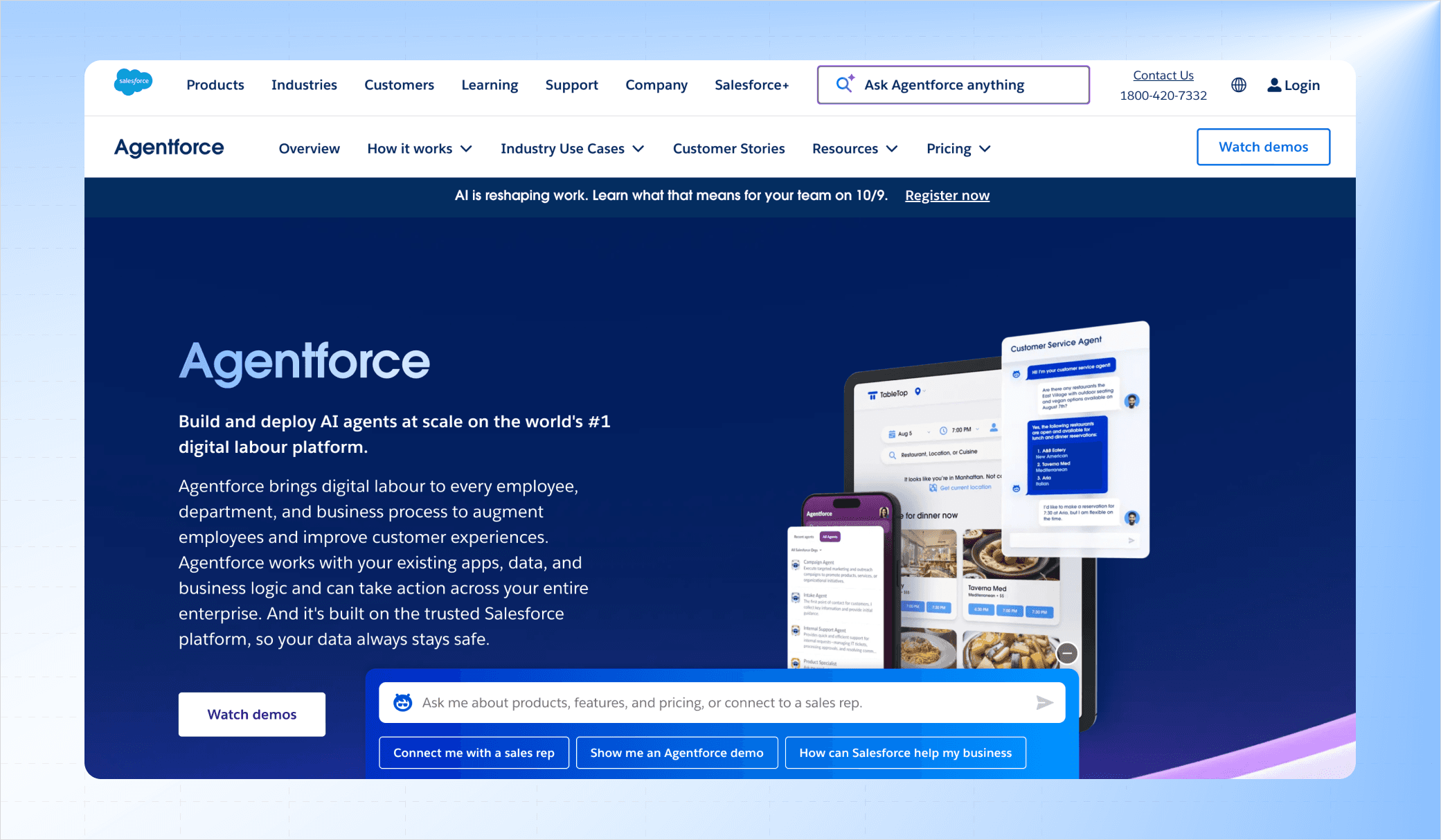
Architecture: RAG-based AI within Salesforce ecosystem
For enterprises deeply invested in Salesforce, Agentforce provides tight integration with Service Cloud and broader Salesforce ecosystem.
Key Strengths:
✓ Unmatched Salesforce ecosystem integration
✓ Access to unified customer data across Salesforce clouds
✓ Enterprise-grade security and compliance
✓ Good case routing and field suggestions
Limitations:
✗ Requires expensive Salesforce subscriptions
✗ Longest implementation timeline (4-6 weeks)
✗ Lower autonomous resolution compared to agentic platforms
✗ Most expensive option overall
✗ Less effective as standalone tool
Performance Metrics [vendor]:
Resolution rate: 40-50%
Case routing improvement: ~40%
Agent productivity improvement: ~25%
Best For: Large enterprises (500+ employees) with existing Salesforce Service Cloud implementations and heavy Salesforce investments.
When to Choose Over Fini: If you've made massive investments in Salesforce customization and need everything within the Salesforce universe.
Pricing: $30+ per user/month (requires Salesforce Service Cloud license starting at $75-300+ per user/month)
Total Cost of Ownership: $105-330+ per user/month
7. Help Scout AI - Solid for Email-First Teams
Testing Results: 38% average resolution rate | 57% accuracy | 11% hallucination rate | 1-week deployment
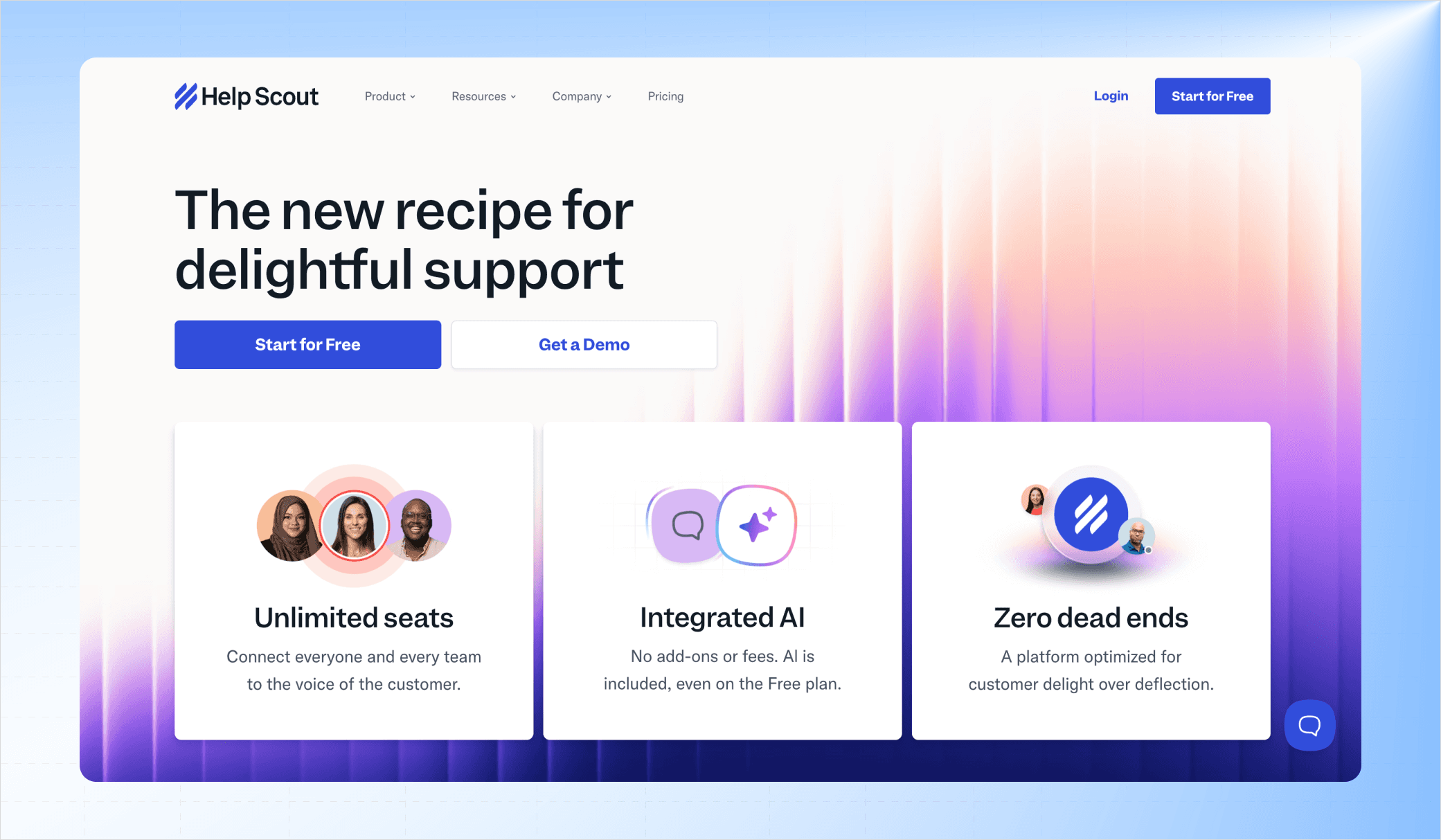
Architecture: RAG-based AI optimized for email
Help Scout AI focuses on enhancing email-based support with draft suggestions and knowledge base optimization.
Key Strengths: ✓ AI draft assistance for email responses
✓ Clean, intuitive interface
✓ Good for augmenting human agents
✓ Strong customer service from Help Scout
✓ Low learning curve
Limitations: ✗ Limited autonomous resolution
✗ Primarily email-focused
✗ Fewer languages (15+)
✗ Basic automation capabilities
Performance Metrics [tested]:
Resolution rate: 35-45%
Response quality improvement: ~30%
Agent satisfaction improvement: ~20%
Best For: Small teams (under 20 agents) handling primarily email support who value simplicity.
When to Choose Over Fini: If you're a small email-only team that needs agent assist rather than autonomous resolution.
Pricing: $20-50 per user/month
8. Tidio - Good for Small Business Websites
Testing Results: 34% average resolution rate | 52% accuracy | 14% hallucination rate | 1-week deployment
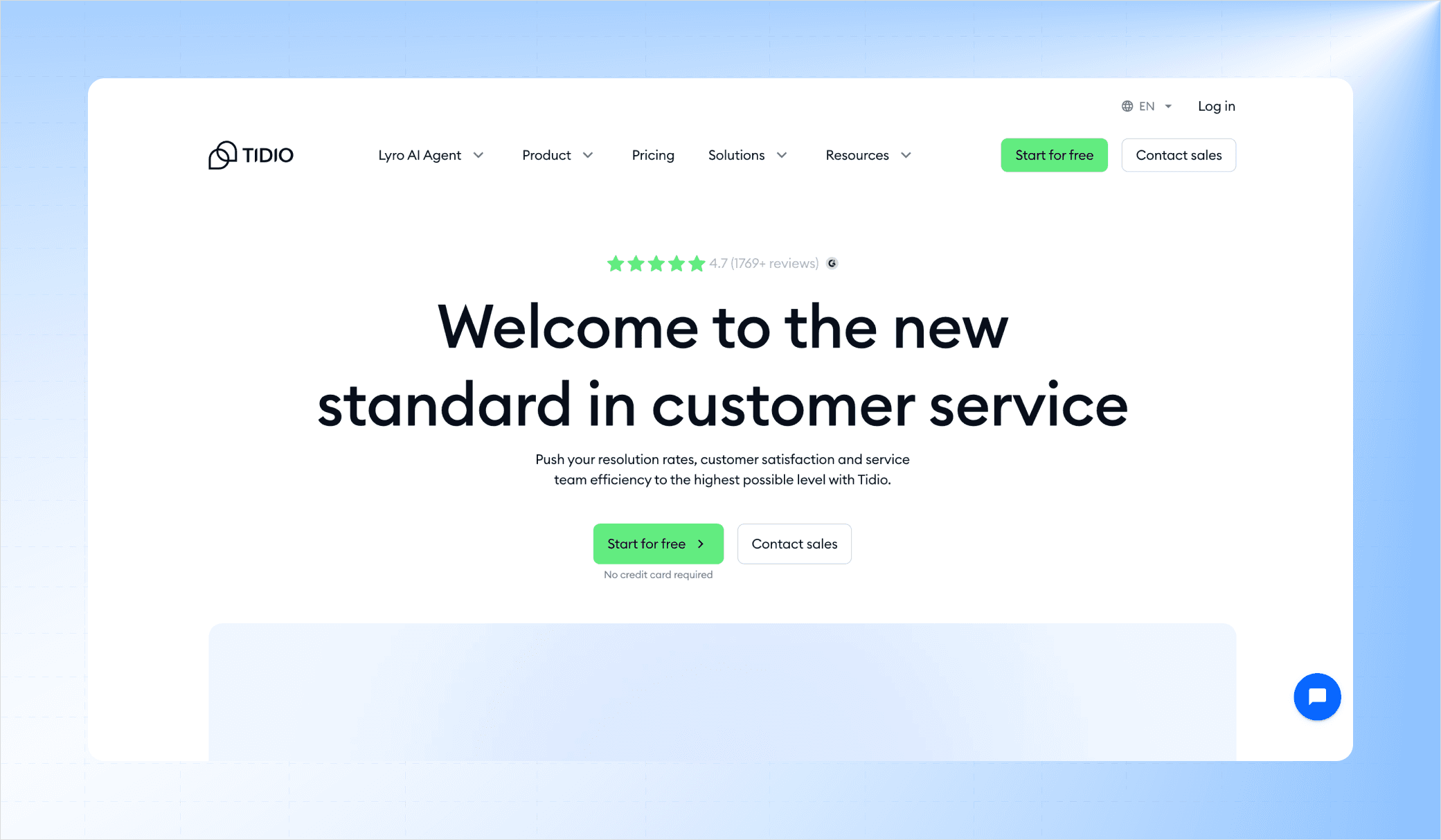
Architecture: Basic chatbot with some AI capabilities
Tidio provides accessible chat and basic AI chatbot capabilities at price points suitable for small businesses.
Key Strengths: ✓ Very easy setup
✓ Affordable for small businesses
✓ Good for website lead capture
✓ Basic e-commerce integration
✓ No technical knowledge required
Limitations: ✗ Lower accuracy and resolution
✗ Limited to chat channel
✗ Basic automation capabilities
✗ Higher hallucination rates
Performance Metrics [tested]:
Resolution rate: 30-40%
Lead capture improvement: ~50%
Website engagement improvement: ~35%
Best For: Very small businesses (<10 agents) needing basic website chat.
When to Choose Over Fini: If your budget is under $100/month and you only need basic chat functionality.
Pricing: Free plan available; paid plans from $24/month
9. Microsoft Copilot for Service - Best for Microsoft Users
Performance Metrics [vendor]: 35-45% resolution rate | 55-60% accuracy | 2-4 week deployment
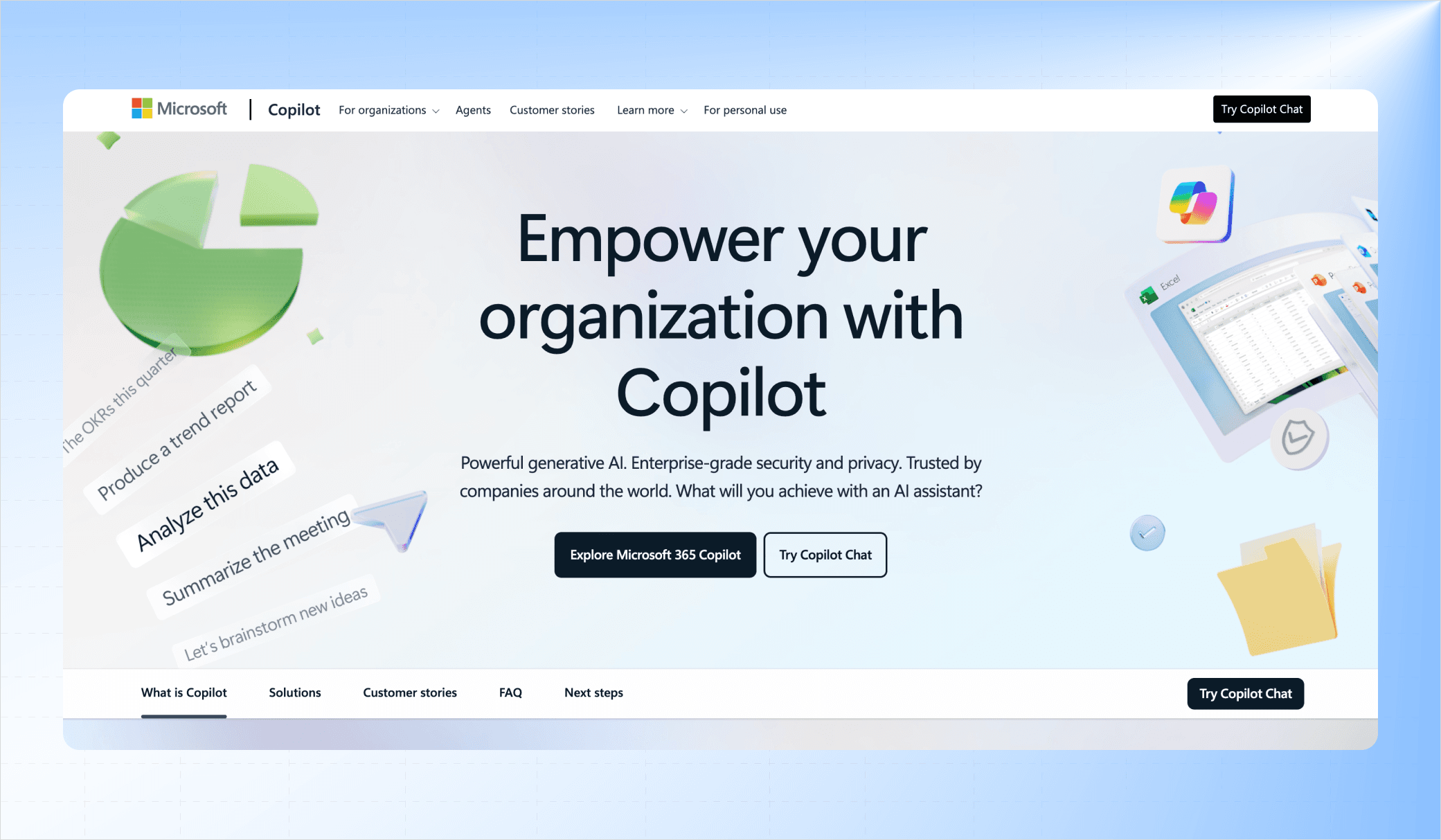
Architecture: RAG-based AI within Microsoft 365 ecosystem
Microsoft's Copilot integrates AI across the Microsoft 365 ecosystem for organizations already using Microsoft tools.
Key Strengths: ✓ Excellent for Microsoft 365 users
✓ Strong knowledge access across Microsoft apps
✓ Enterprise security and compliance
✓ Natural workflow integration
✓ Familiar Microsoft interface
Limitations: ✗ Lower autonomous resolution
✗ Primarily agent assist
✗ Limited integrations outside Microsoft
✗ Best value requires full M365 investment
Performance Metrics [vendor]:
Resolution rate: 35-45%
Office productivity improvement: ~30%
Knowledge access improvement: ~40%
Best For: Large organizations (500+ employees) using Microsoft 365 and Dynamics 365.
When to Choose Over Fini: If you're completely standardized on Microsoft 365 and want everything within that ecosystem.
Pricing: $30+ per user/month (requires Microsoft 365)
10. LiveChat - Good for Real-Time Chat
Testing Results: 33% average resolution rate | 51% accuracy | 13% hallucination rate | 1-week deployment
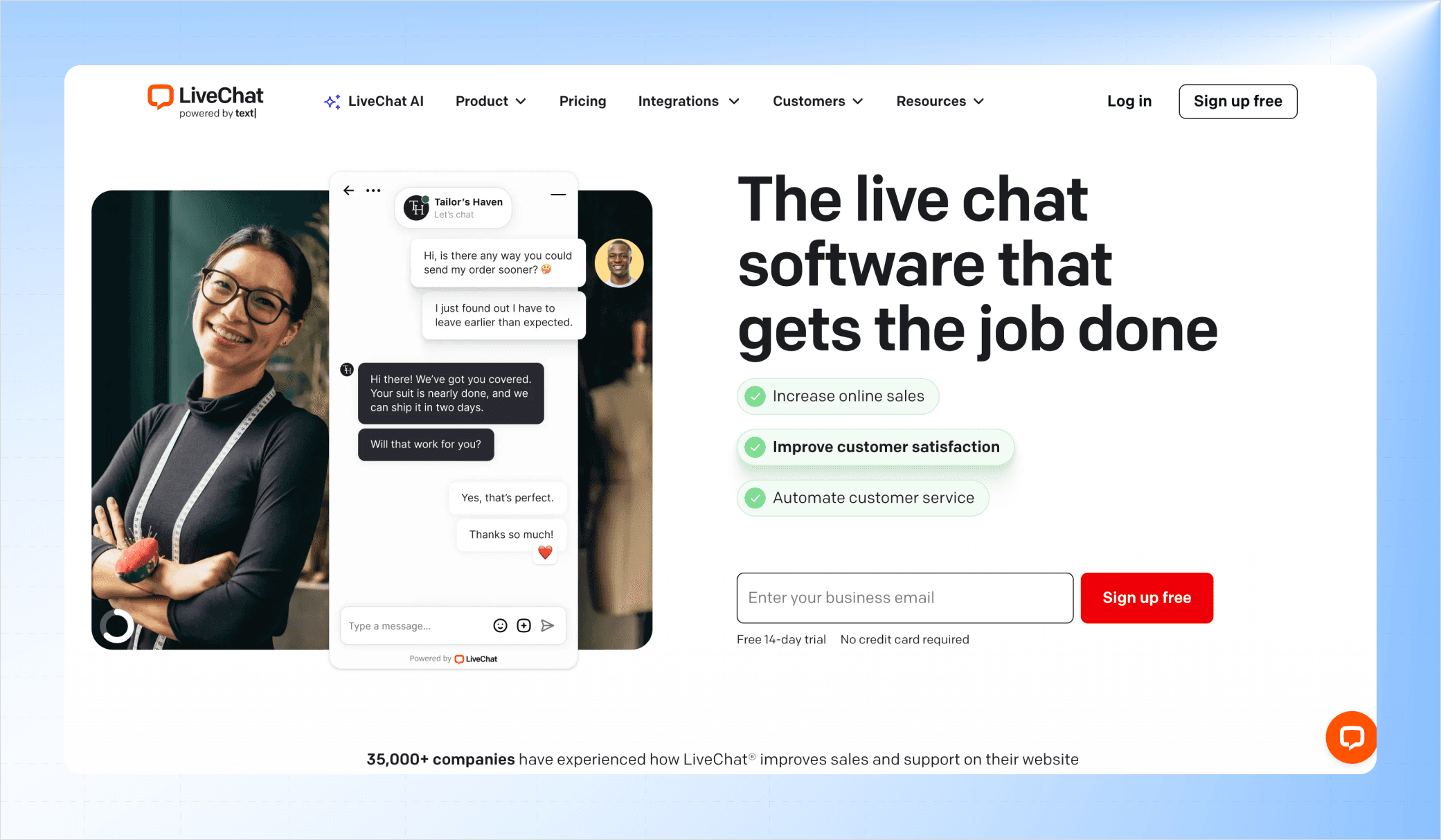
Architecture: Basic chatbot with AI routing
LiveChat provides AI-enhanced real-time communication with strong mobile support.
Key Strengths: ✓ Strong real-time chat experience
✓ Good mobile application
✓ Affordable for small teams
✓ Auto-translation features
✓ Easy to use
Limitations: ✗ Lower autonomous resolution
✗ Primarily chat-focused
✗ Basic AI capabilities
✗ Limited action execution
Performance Metrics [tested]:
Resolution rate: 30-40%
Response time improvement: ~70%
Customer engagement improvement: ~25%
Best For: Small businesses needing real-time, mobile-friendly chat.
When to Choose Over Fini: If you primarily need live chat with human agents and basic AI routing.
Pricing: $20+ per agent/month
Decision Framework: Choosing the Right Platform {#decision-framework}
By Support Volume
Low Volume (<500 tickets/month):
Best Options: Tidio, Help Scout, LiveChat, Freshdesk Freddy
Why: Lower fixed costs make sense at low volumes
Key Factor: Simplicity and ease of use
Expected ROI: 8-12 months
Medium Volume (500-5,000 tickets/month):
Best Options: Fini, Freshdesk Freddy, Intercom Fin
Why: Higher automation starts delivering significant ROI
Key Factor: Cost per resolution becomes more important than per-agent pricing
Expected ROI: 3-6 months
High Volume (5,000+ tickets/month):
Best Options: Fini, Ada CX, Zendesk AI (if already on Suite)
Why: Maximum automation is critical; usage-based pricing often beats per-agent
Key Factor: Resolution rate directly impacts cost savings
Expected ROI: 3-4 months
By Use Case Complexity
Simple FAQ Support:
Best Options: Tidio, LiveChat, Help Scout
Why: Basic chatbots can handle straightforward questions affordably
Target Automation: 30-40%
Mixed Complexity (FAQs + Some Actions):
Best Options: Intercom Fin, Zendesk AI, Freshdesk Freddy
Why: Good balance for varied support needs
Target Automation: 40-60%
Complex Actions Required:
Best Options: Fini, Ada CX (for e-commerce)
Why: Only agentic platforms can execute complex workflows
Target Automation: 70-85%
By Integration Requirements
Single-Platform Organizations:
Zendesk Suite → Zendesk AI
Salesforce → Agentforce
Microsoft 365 → Copilot
Intercom → Intercom Fin
Multi-Platform or Flexible:
Fini integrates with 20+ platforms natively
Ada CX offers broad e-commerce integrations
Most others require custom API work
By Language Requirements
English Only: Any platform works well
Multi-Language (5-20 languages): Most platforms support this adequately
Extensive Multi-Language (20-50 languages): Intercom Fin (45+), Ada (50+)
Global Operations (50+ languages): Fini (100+) with consistent accuracy
By Budget
<$500/month:
Options: Tidio, LiveChat, Help Scout basic plans
Trade-off: Basic automation, agent assist only
$500-2,000/month:
Options: Freshdesk Freddy, Fini Basic
Trade-off: Good automation, growing with you
$2,000-10,000/month:
Options: Fini Growth, Zendesk AI, Ada CX
Trade-off: Strong automation, enterprise features
$10,000+/month:
Options: Salesforce Agentforce, Microsoft Copilot, Fini enterprise
Trade-off: Maximum customization, enterprise support
Important: Focus on cost per resolution, not just monthly platform fees. A more expensive platform with 75% automation often costs less total than a cheap platform with 30% automation.
Key Metrics to track while choosing the best AI support agent for your business
Core Performance Metrics:
Automation Rate
Formula: (Queries resolved by AI / Total queries) × 100
Target: 60-70% (good), 70-85% (excellent)
Track weekly
Resolution Accuracy
Formula: (Correct resolutions / Total AI resolutions) × 100
Target: 85%+ to maintain customer trust
Track daily during rollout, weekly after stabilization
Hallucination Rate
Formula: (Incorrect information provided / Total responses) × 100
Critical: Keep under 5%, ideally under 2%
Track daily
First Contact Resolution (FCR)
Formula: (Queries resolved in first interaction / Total queries) × 100
Target: 20-40% improvement over baseline
Track weekly
Average Handle Time (AHT)
Formula: Total resolution time / Number of queries
Target: 50-70% reduction for automated queries
Track weekly
Customer Impact Metrics:
Customer Satisfaction (CSAT)
Formula: (Satisfied customers / Total respondents) × 100
Target: Maintain or improve existing scores (80%+ excellent)
Track daily
Net Promoter Score (NPS)
Formula: % Promoters - % Detractors
Target: 5-10 point improvement over time
Track monthly
Customer Effort Score (CES)
Formula: Average rating on effort scale
Target: Reduction indicating smoother experience
Track weekly
Business Impact Metrics:
Cost Per Resolution
Formula: Total support cost / Total tickets resolved
Target: 30-50% reduction
Track weekly
Support Team Productivity
Formula: Tickets handled per agent with AI assistance
Target: 25-40% improvement
Track weekly
Time to Value
Formula: Average time from query to resolution
Target: Significant improvement in speed
Track weekly
Revenue Impact
Formula: Effect on retention, upsells, lifetime value
Target: Varies by business model
Track monthly
Finding the Right Fit for Your Business
Choosing an AI customer support tool is ultimately about matching capabilities to your specific needs. There's no single "best" platform, only the best platform for your particular situation.
Start with your constraints: Define your budget, integration requirements, and must-have features before evaluating options.
Test with real data: Don't rely solely on demos with sanitized data. Request trials using your actual historical tickets to see real-world accuracy.
Consider the total package: The cheapest platform may cost more long-term if accuracy is poor. The most expensive may include features you'll never use. Focus on value for your specific use case.
Plan for growth: Choose a platform that can scale with your business. Migration costs and disruption make switching platforms expensive.
Most importantly, remember that implementation success depends as much on your knowledge base quality, team adoption, and ongoing optimization as on the tool itself. Even the best AI platform needs clean data, clear processes, and committed support to deliver maximum value.
Whether you choose an agentic platform like Fini for maximum automation, a conversational AI like Ada for personalized interactions, or ecosystem-specific tools like Zendesk AI or Salesforce Agentforce, the key is thoughtful evaluation followed by committed implementation.
With features like agentic actions, free AI help center, and cross platform integrations, Fini makes it easier for your team to deliver great support and fits seamlessly into your workflows
Ready to get started? Book your personalized demo today, or reach out to us at founders@usefini.com to learn more.
1. What are AI customer support tools, and why are they essential in 2025?
AI customer support tools are intelligent platforms that use artificial intelligence to automate customer interactions, resolve issues in real time, and enhance service efficiency. In 2025, they’ve become essential because customers expect instant, personalized, and 24/7 support across multiple channels. These tools now go beyond scripted chatbots, they interpret context, perform real actions like refunds or account updates, and maintain compliance across complex workflows. Businesses using modern AI tools such as Fini or Intercom Fin report up to 80% automation in tier-1 queries, faster resolution times, and significant reductions in operational costs.
2. How do AI chatbots differ from modern AI customer support platforms?
Traditional chatbots operate on fixed scripts or decision trees, meaning they can only respond to specific phrases or simple FAQs. Modern AI customer support platforms, however, leverage natural language understanding (NLU) and reasoning capabilities to understand intent and context. They access knowledge bases dynamically and, in advanced cases like Fini’s agentic AI, can execute real-world actions such as processing a refund, updating user details, or validating identity. The difference lies in capability, chatbots respond, whereas AI platforms resolve issues autonomously, improving both CSAT and cost efficiency.
3. What makes agentic AI systems different from other types of support automation?
Agentic AI systems, a term that gained prominence in 2025, go a step beyond conversational AI by reasoning through complex workflows and taking contextual actions across business systems. For instance, when a customer requests a subscription cancellation, agentic AI doesn’t just explain the steps, it logs into the CRM, cancels the plan, processes the refund, and confirms the update. This makes tools like Fini uniquely powerful, achieving 70–85% automation with accuracy levels above 90%. They act as autonomous agents that work with human support teams rather than replacing them, drastically reducing time-to-resolution and repetitive workload.
4. How accurate are AI customer support tools today?
Accuracy has improved dramatically with the introduction of agentic and RAG-less systems. While basic chatbots still average around 40–50% accuracy, modern assistants like Intercom Fin or Ada CX achieve 70–80%, and advanced agentic platforms such as Fini consistently exceed 90% accuracy with under 1% hallucination rates. The main factors influencing accuracy include the quality of your knowledge base, how cleanly your support data is structured, and whether your AI is trained for reasoning or retrieval. In short, 2025 AI systems are not just correct, they’re reliable, traceable, and policy-compliant.
5. Can AI customer support tools completely replace human agents?
No, AI customer support tools are not designed to eliminate humans, they’re meant to amplify them. The most effective implementations use AI to automate tier-1 repetitive requests (like password resets, order tracking, or refunds), freeing human agents to handle tier-2 and tier-3 cases that require empathy, reasoning, or negotiation. Businesses that combine automation and human escalation, such as using Fini’s confidence-based routing - achieve the best results: higher resolution rates, better employee satisfaction, and smoother customer experiences.
6. What kind of ROI can businesses expect from AI support automation?
Return on investment depends on ticket volume and workflow complexity, but companies adopting AI support tools typically see between 200%–400% ROI within the first year. Automation reduces costs by 30–70%, speeds up resolutions by 50–80%, and can improve customer satisfaction (CSAT) by 8–10 points. For example, a company resolving 5,000 monthly tickets with an average $50 cost per ticket could save $75,000 to $125,000 monthly using Fini’s automation. In addition, these tools help retain customers and generate new revenue through faster issue resolution and upsell recommendations.
7. How long does it take to implement AI customer support software?
Implementation timelines vary widely based on complexity. Basic chatbots can go live within a week, while AI assistants typically need 2–8 weeks for setup, integration, and training. Enterprise systems integrated with CRMs like Salesforce or Zendesk may take several months. However, modern platforms such as Fini are built for rapid deployment, most go live in under 48 hours thanks to their no-code setup and automated knowledge ingestion. Factors like security reviews, multi-language support, and team readiness also influence rollout speed.
8. What metrics should companies track to measure AI support success?
Key performance metrics include resolution rate, accuracy, first contact resolution, and average handle time, all of which indicate how efficiently AI handles customer queries. Businesses should also track CSAT and NPS for customer impact, cost per resolution for financial ROI, and hallucination rate for quality assurance. High-performing systems like Fini achieve 80–90% resolution, 99% completeness, and less than 1% misinformation, while maintaining compliance across regions. Monitoring these metrics regularly ensures you’re not just automating support but also improving it.
9. What security and compliance standards should an AI support platform meet?
In 2025, security is non-negotiable. Enterprise-grade AI platforms must comply with SOC 2 Type II, ISO 27001, and GDPR as a baseline. Sector-specific standards such as HIPAA for healthcare or PCI-DSS for payments are equally critical. Tools like Fini go beyond compliance by offering regional data residency, encryption at rest and in transit, role-based access controls, and audit logs for full traceability. Always verify that your AI vendor doesn’t use customer data for external model training, a requirement for GDPR and the upcoming EU AI Act.
10. How do AI customer support platforms integrate with existing help desks?
The best AI customer support systems integrate seamlessly with tools you already use, such as Zendesk, Intercom, Salesforce, Freshdesk, or HubSpot. Integration types range from native (like Zendesk AI) to multi-platform (like Fini or Ada) to API-based custom setups. When evaluating integration quality, ensure the platform offers bi-directional syncing, preserves agent workflows, and supports data handoff between systems. The ability to plug into multiple CRMs and messaging channels without disrupting existing workflows is now a key differentiator for enterprise buyers.
11. What happens when AI gets something wrong?
Modern AI systems are designed with error-handling frameworks. When confidence in a response is low, the AI automatically escalates the query to a human agent while preserving context. Platforms like Fini include rollback options for sensitive actions, such as refunds or account updates, ensuring reversibility. Continuous learning loops enable the AI to learn from every mistake, improving accuracy over time. Error transparency, confidence scoring, and escalation intelligence are now considered essential to maintaining trust and accountability in automated systems.
12. How much do AI customer support tools cost in 2025?
Pricing varies depending on scale, deployment type, and support complexity. Entry-level tools like Tidio or LiveChat start at $20–$50 per month, while advanced AI assistants such as Intercom Fin or Freshdesk Freddy range from $500–$2,000 monthly. Enterprise solutions like Salesforce Agentforce, Microsoft Copilot, or Fini’s usage-based model typically range from $5,000–$20,000+ per month. When budgeting, focus on cost per resolution and ROI, not just subscription fees, since high-accuracy automation can save far more than it costs.
13. Can AI tools provide multilingual customer support effectively?
Yes, but quality varies widely. Basic tools handle 15–30 languages with moderate accuracy, while advanced ones like Ada CX cover 50+, and Fini leads the market with over 150 languages supported natively. What matters most is not the number of languages but the accuracy, fluency, and action consistency across them. In global businesses, platforms that combine translation with reasoning, rather than word-for-word conversion, deliver the most reliable multilingual experiences without losing context or brand tone.
14. Which AI customer support tool offers the best balance between price and performance?
For small to medium businesses, Freshdesk Freddy and Intercom Fin provide strong automation at manageable pricing. For enterprises prioritizing automation depth, Fini stands out for its agentic AI architecture, multilingual accuracy, and guaranteed performance model. Companies already embedded in Salesforce or Microsoft ecosystems may find Agentforce or Copilot more synergistic. Ultimately, the best tool balances resolution capability, integration flexibility, and ROI for your specific use case rather than being the cheapest or the most complex.
15. What are the biggest trends shaping AI customer support in 2025?
The 2025 landscape is defined by three major shifts: agentic AI replacing RAG-based assistants, multimodal understanding across text, email, and chat, and regulatory alignment under frameworks like the EU AI Act. Businesses are prioritizing accuracy over novelty, focusing on agentic systems that can execute verified actions securely. Furthermore, companies are measuring “trust metrics” such as hallucination rate and policy adherence alongside traditional KPIs, making the next generation of AI support not just conversational, but operationally dependable.
Co-founder


















